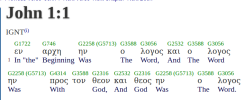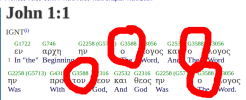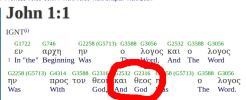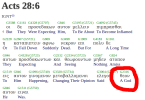A
A_Son_of_God
Guest
It is known by many that in John 1:1, the Bible speaks of Jesus, calling him the Word of God.
But then the next section says that this word was WITH God, and the word - according to some Bibles - WAS God. But other Bibles state something like "...was A god", or "...was divine in nature". Some believe that only Jehovah's Witnesses believe this, and accuse them of changing the Bible. But this is simply not true.
But what's the issue?
The issue is, either Jesus is being called God or not. Being "a god", or "divine" just states that he was divine in nature, whereas being God means something different.
So in this article, we're going to analyse the language of the part of the Bible it refers to, and clarify it once and for all. Others have done so in the past, and you can refer to one of the articles here.
First of all, let's imagine the scriptural meaning was accurately translated "WAS God". Does this mean God is a trinity? No. Trinity refers to three, but this would only allow a "Binity", as there are only two mentioned. So it isn't an argument that supports the Trinity at all, but only one that - if there was no counterargument - would equate Jesus with God.
Second, we need to consider the idea of the rest of the verse. We see the word was "in the beginning". What beginning? Considering God doesn't have a beginning, it must therefore refer to something else. So, at the beginning of some specific thing that at this stage isn't known, there was the Word, that was with God. So, if it was WITH God, it means it is a separate entity to God. Is that not reasonable? To be WITH someone means that there is a separate entity that a person is WITH.
But then it states - according to the King James Version, the Douay Versions and others - "and the word WAS God."
So, there is a very important reason for analysing this, as the language is very unclear - IF the meaning was that the Word was God, at least.
The Evidence
Here, I'm posting some of the text as written in the Greek languages. Take note though that the Greek part of the Scriptures were written in Koine Greek, and not modern day Greek. Just like how prior to the Babylonian captivity, the Hebrew used was an ancient Hebrew, and not the modern day Hebrew we see now in way of lettering.
1) The way it is written in one interlinear script.

In the above, we have the breakdown of this scripture, with the English translation written underneath. You will notice that there are four "definite articles", that are circled in the example below. Namely, these definite articles are given the number G3588 in the Interlinear Bible here. Here is a link to the page "G3588", so you can study it for yourself. You will see it is used to demonstrate what is a definite article.
Looking at the below, I have circled this G3588, and you will notice that in this verse, it is used four times. But one of these four is different from the rest. Why? Because the three are in the masculine gender, where the fourth is in the neutral gender. Some languages use gender, and Greek is one of them.
In fact, if you look at the word "God", you will see it is G2316, and although it is written in there twice, both times are different, due to this gender.

You will notice on the one with the neutral gender, no "the" is written below it, although if you notice the use of the language, it is important to have a "the" there, making "God" a definite article.
But now note the below. I have highlighted a difference between the words with a definite article, and those that don't have it.

Here you will notice that there is no definite article before the word Theos. Therefore, Theos is an indefinite article in this instance. What does that mean?
It means that it isn't translated "The God", which is how it should be just two words prior to it, but is an indefinite article, meaning "god" as such. A weakened version of God.
In fact, let's look at another time that this was done in the Bible. It is in Acts 28:6, when Paul was bitten by a snake. Here it is:

So, in this account, Paul had just been bitten by a poisonous snake, and the people were expecting him to fall down dead, but because he didn't die, they believed him to be a god.
But the emphasis for our lesson here is the use of the expression "a god", that is used also in the King James Version in this verse. Look below, as I've highlighted the section, showing that the word translated "A God" - and please don't confuse the capitals, as you'll note that ALL words in this section of scripture are written with capitals - is the same as how it is used in John 1:1, which is mistranslated "God".

Conclusion
So, based on this definite/indefinite article issue, it appears it is more correct to use the term "a god" at John 1:1 after all, as this is how the language defined whether it meant THE God, (or how we in English say "God"), with A God, or a god-like being. Surely, consistency, balanced with the way it is intended to be read by the circumstances around it, are important.
This is why it can be written that the word was both WITH God, and "A god", or of a divine nature, as some other translations have it written, and which Jehovah's people also use, due to it being clear, and not confusing.
But then the next section says that this word was WITH God, and the word - according to some Bibles - WAS God. But other Bibles state something like "...was A god", or "...was divine in nature". Some believe that only Jehovah's Witnesses believe this, and accuse them of changing the Bible. But this is simply not true.
But what's the issue?
The issue is, either Jesus is being called God or not. Being "a god", or "divine" just states that he was divine in nature, whereas being God means something different.
So in this article, we're going to analyse the language of the part of the Bible it refers to, and clarify it once and for all. Others have done so in the past, and you can refer to one of the articles here.
First of all, let's imagine the scriptural meaning was accurately translated "WAS God". Does this mean God is a trinity? No. Trinity refers to three, but this would only allow a "Binity", as there are only two mentioned. So it isn't an argument that supports the Trinity at all, but only one that - if there was no counterargument - would equate Jesus with God.
Second, we need to consider the idea of the rest of the verse. We see the word was "in the beginning". What beginning? Considering God doesn't have a beginning, it must therefore refer to something else. So, at the beginning of some specific thing that at this stage isn't known, there was the Word, that was with God. So, if it was WITH God, it means it is a separate entity to God. Is that not reasonable? To be WITH someone means that there is a separate entity that a person is WITH.
But then it states - according to the King James Version, the Douay Versions and others - "and the word WAS God."
So, there is a very important reason for analysing this, as the language is very unclear - IF the meaning was that the Word was God, at least.
The Evidence
Here, I'm posting some of the text as written in the Greek languages. Take note though that the Greek part of the Scriptures were written in Koine Greek, and not modern day Greek. Just like how prior to the Babylonian captivity, the Hebrew used was an ancient Hebrew, and not the modern day Hebrew we see now in way of lettering.
1) The way it is written in one interlinear script.

In the above, we have the breakdown of this scripture, with the English translation written underneath. You will notice that there are four "definite articles", that are circled in the example below. Namely, these definite articles are given the number G3588 in the Interlinear Bible here. Here is a link to the page "G3588", so you can study it for yourself. You will see it is used to demonstrate what is a definite article.
Looking at the below, I have circled this G3588, and you will notice that in this verse, it is used four times. But one of these four is different from the rest. Why? Because the three are in the masculine gender, where the fourth is in the neutral gender. Some languages use gender, and Greek is one of them.
In fact, if you look at the word "God", you will see it is G2316, and although it is written in there twice, both times are different, due to this gender.

You will notice on the one with the neutral gender, no "the" is written below it, although if you notice the use of the language, it is important to have a "the" there, making "God" a definite article.
But now note the below. I have highlighted a difference between the words with a definite article, and those that don't have it.

Here you will notice that there is no definite article before the word Theos. Therefore, Theos is an indefinite article in this instance. What does that mean?
It means that it isn't translated "The God", which is how it should be just two words prior to it, but is an indefinite article, meaning "god" as such. A weakened version of God.
In fact, let's look at another time that this was done in the Bible. It is in Acts 28:6, when Paul was bitten by a snake. Here it is:

So, in this account, Paul had just been bitten by a poisonous snake, and the people were expecting him to fall down dead, but because he didn't die, they believed him to be a god.
But the emphasis for our lesson here is the use of the expression "a god", that is used also in the King James Version in this verse. Look below, as I've highlighted the section, showing that the word translated "A God" - and please don't confuse the capitals, as you'll note that ALL words in this section of scripture are written with capitals - is the same as how it is used in John 1:1, which is mistranslated "God".

Conclusion
So, based on this definite/indefinite article issue, it appears it is more correct to use the term "a god" at John 1:1 after all, as this is how the language defined whether it meant THE God, (or how we in English say "God"), with A God, or a god-like being. Surely, consistency, balanced with the way it is intended to be read by the circumstances around it, are important.
This is why it can be written that the word was both WITH God, and "A god", or of a divine nature, as some other translations have it written, and which Jehovah's people also use, due to it being clear, and not confusing.